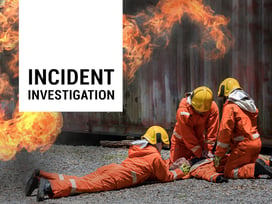A lot is written about incident investigations and how to perform an effective one.
Here are some insights and hints from our experience:
- All evidence will not be forthcoming unless the investigation is blame free.
- First obtain a general picture of the incident, visit the scene , take pictures.
- For a serious incident, carry out interviews ASAP. Memories fade rapidly
- Separate witnesses. Once witnesses have interacted, a communal view will prevail.
- Witness evidence is notoriously unreliable.
- Witness evidence from before the incident is less reliable than that from immediately after the incident.
- “Then the relief valve on the high pressure boiler lifted” A later study of the DCS trends and alarm information showed clearly it was a vent valve on a process gas system.
- Witnesses are influenced by guilt and will rationalize their own actions and be concerned about implicating colleagues
- As an interviewer, you will need to be persistent and at times recycle facts uncovered in the analysis to get to the truth.

|

|

|
| THIS online INCIDENT INVESTIGATION TRAINING course is to train the course participants to actively participate in SiD workshops. |
Find out about our upcoming DEMONSTRATING SFARP/SFAIRP training course HERE! |
Our 2-day HAZOP LEADER course is IChemE approved, find out more HERE! |
- Develop a timeline based on facts.
- Collect physical evidence, take photos, permits, mark location, collect control data, procedures, training records, maintenance records.
- Remember in the event of a serious injury or fatality, the scene must not be disturbed without approval from WorkSafe or the Police – unless there is an immediate ongoing danger to life or essential services.
- Collate and analyze the evidence to develop alternative scenarios leading to the immediate causes, then progress to the root causes. Remember “All incidents are the result of management failures”. To quote Trevor Keltz –”blaming human error as the cause of an incident is about as useful as blaming gravity as the cause of a fall”.
- Propriety tools are available, some of which can be quite useful in leading to root causes, others are fine for investigating a fall from a ladder but not very helpful with an incident involving complex technology.
Investigating Process Safety events are very similar to the above, however there are some additional things to think about. Click here for more on process safety incident investigations
If you would like to self-assess your current incident investigation at your site, have a look at this checklist.
Ready to take your process safety strategy to the next level?
Explore our Safety in Design, to build practical, defensible safety solutions. If you're focused on compliance and risk-based decision-making, our Process Safety Foundation course is a must.
Have questions or need guidance? GET IN TOUCH with our team. We're here to help.